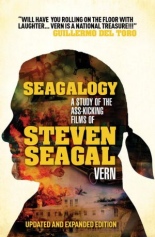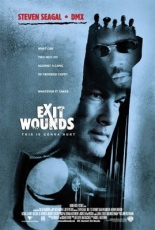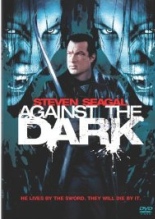
 One of the books I’ve looked forward to the most this year has been David Konow’s Reel Terror, a paperback original aiming to tell, as its subtitle promises, 100 years of horror-movie history. I cannot say that it disappointed me in offering behind-the-scenes stories on scads of classic films, even if DVD documentaries and/or commentaries have rendered most of them superfluous.
One of the books I’ve looked forward to the most this year has been David Konow’s Reel Terror, a paperback original aiming to tell, as its subtitle promises, 100 years of horror-movie history. I cannot say that it disappointed me in offering behind-the-scenes stories on scads of classic films, even if DVD documentaries and/or commentaries have rendered most of them superfluous.
While he hits all the usual suspects — many of them the subjects of their own texts, including Night of the Living Dead to The Exorcist — it’s also nice to see due given to less acclaimed but no less entertaining flicks like Creepshow, The Evil Dead or the Hammer output.
I can forgive that the new wave of Saw and Paranormal Activity franchises don’t merit more than a few lines in an epilogue, as insanely profitable and hugely influential as they already are. I’m also willing to overlook that, unlike Jason Zinoman’s recent and superior Shock Value, Konow doesn’t attempt to thread it all together into a nifty narrative that places the films in a cultural perspective.
What I cannot forgive, however, is that the author has made an ungodly amount of errors. Either Reel Terror skipped the fact-checking and shaping processes, or — and I’m not being hyperbolic — is perhaps the worst-edited work of nonfiction I’ve seen come out of a major publishing house. The repetition alone is maddening.
Like what, you ask? Well, for instance:
On page 47, we get this quote from Twilight Zone writer George Clayton Johnson: “Rod had been shaping the idea of doing half-hour science fiction stories because that way he could escape some of the worst aspects of censorship.”
Two pages later, we get this quote, also from Johnson: “He had been shaping the idea of doing half-hour science fiction stories because that way he could escape some of the worst aspects of censorship.”
On page 181, in the Jaws chapter, we’re introduced to “Jeffrey Kramer, who played Deputy Hendricks,” and three pages later, we meet “Jeffrey Kramer, who played Deputy Hendricks.”
On page 199, while discussing The Omen, Konow writes, “Seltzer named his Antichrist Damien after Father Damien, who was one of his idols. A single sentence later, the next paragraph begins, “Father Damien was one of Seltzer’s idols.”
On page 464, Konow states that “There’s a joke in Hollywood that directors don’t want writers around once a movie’s under way, comparing them to hookers that won’t leave after they’ve been paid, but Demme kept Tally around for just about everything.” That joke must be worth repeating, because on page 508, he writes, “Unlike a lot of productions where the writer’s the hooker overstaying her welcome, Williamson was very welcome on the set.”
The author’s mistakes are factual as well. We learn that Jaws “made $7,061,513 opening weekend, which today would be $70,000,000, almost twice what The Dark Knight made opening weekend.” TDK‘s actual opening weekend, per BoxOfficeMojo.com, was $160,887,295, meaning Konow is off by roughly $126 million.
We’re told Richard Donner “had also done two feature films prior to The Omen, X-15 and Salt and Pepper, starring Sammy Davis, Jr., and Peter Lawford.” This ignores Donner’s Lolita knock-off starring Charles Bronson, Lola, readily available on many public-domain collections.
Titles just are not Konow’s strong suit, either, despite the ease provided by the Internet Movie Database, not to mention poster images galore available via Google’s image search function. John Carpenter’s 1978 telefilm Someone’s Watching Me! is correctly listed (although without exclamation mark) on page 252, but then incorrectly named two sentences later as Someone Is Watching Me. On page 258, it becomes Somebody’s Watching Me. All future instances are correct, if you forgive that pesky punctuation. Outside the book’s genre, the maternal word in Throw Momma from the Train is Mama on page 460.
And then there are the misspellings — not typos, but brazen misspellings, especially in a work on horror films. Witness:
• genre staple Lance Henriksen, credited on page 205 as “Lance Hendrickson”;
• the Child’s Play killer doll Chucky, noted on page 497 as “Chuckie”; or
• Edgar Allan Poe, appearing on page 444 with the middle name of “Allen.” I see that error all the time, but again, this is a book devoted to horror history. There should be no excuses when you’re discussing the guy who arguably kickstarted the entire genre.
It’s as if Konow did most of the homework assignment, but didn’t check his answers before turning it in. With such a public forum at stake, that, my friends, is frightening. —Rod Lott

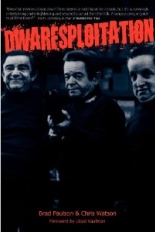
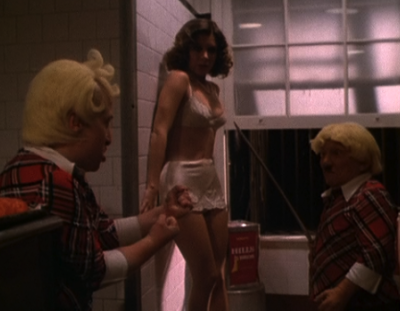 You’re not going to get deep insight into the films featured. That’s not the point. The point is celebrating the little guy, in an easygoing manner that’s both affectionate and amusing. For example, take this sentence from their look at
You’re not going to get deep insight into the films featured. That’s not the point. The point is celebrating the little guy, in an easygoing manner that’s both affectionate and amusing. For example, take this sentence from their look at 